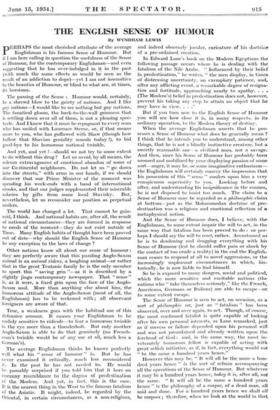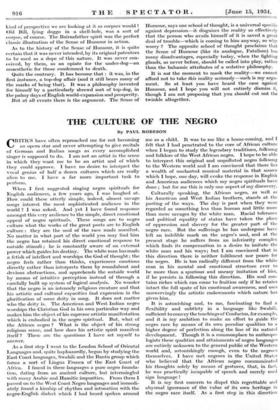THE ENGLISH SENSE OF HUMOUR
By WYNDHAM LEWIS PERHAPS the most cherished attribute of the average Englishman is his famous Sense of Humour. But if I am here calling in question the usefulness of the Sense of Humour, for the contemporary Englishman—and even suggesting that he has over-indulged, in it in the past (with much the same effects as would be seen as the result of an addiction to dope)—yet I am not insensitive to the beauties of Humour, or blind to what are, at times, its heroisms.
The passing of the Sense c_ Humour. would, certainly, be a shrewd blow to the gaiety of nations. And I like gay nations—I would like to see nothing but gay nations. The fanatical gloom, the back-to-the-wall grimness that is settling down over all of them, is not a pleasing spec- tacle. And I know that it must be repugnant toevery man who has smiled with Laurence Sterne, or, if that means more to you, who has guffawed with Shaw (though how hollow that Shavian geniality, sounds today !), to bid good-bye to his humorous national twinkle.
And yet, and yet !—should we not try to some extent to do without this drug ? Let us avoid, by all means, the solemn extravagances of emotional abandon of some of our Coatinental neighbours. Do not let us " go down into the streets," with arms in our hands, if we should discover that our Prime Minister of the moment was spending his week-ends with a band of international crooks, and that our judges supplemented their miserable salaries by gifts from some local Stavisky. But, nevertheless, let us reconsider our position as perpetual smilers.
The world has changed a lot. That cannot be gain- said, I think. And national habits are, after all, the result of national circumstances—they are formed in response to needs of the moment—they do not exist outside of Time. Many English habits of thought have been proved out of date--why should the English Sense of Humour be any exception to the laws of change ?
Other nations know all about our sense of humour : they are perfectly aware that this puzzling Anglo-Saxon animal is an animal ridens, a laughing animal—or rather that in the great Teutonic family he is the only member to sport this " saving grin "—as it is described by a slightly jingo contemporary newspaper. That " sense " is, as it were, a fixed grin upon the face of the Anglo- Saxon soul. More than anything else about him, the humorous attitude of the Anglo-Saxon (most of all, the Englishman) has to be reckoned with ; all observant foreigners are aware of that.
True, a weakness goes with the habitual use of this defensive armour. It causes your Englishman to be unduly sensitive to ridicule—to fear a humorous twinkle in the eye more than a thunderbolt. But only another Anglo-Saxon is able to do that genuinely (no French- man's twinkle would be of any use at all, much less a German's).
The average. Englishman thinks he knows perfectly well what his " sense of humour " is. But he has never examined it critically, much less reconsidered it. In the past he has not needed to. He would be passably surprised if you told him that it bore an uncanny resemblance to the dogma of predestination of the Moslem. And yet, in fact, this is the case. It is the nearest thing in the West to the famous fatalism of the Asiatic. It might, indeed, be regarded by the Oriental, in certain circumstances, as a non-religious, and indeed obscenely jocular, caricature of his doctrine of a pre-ordained creation.
In Edward Lane's book on the Modern Egyptians the following passage occurs where he is dealing with the fatalism of. the Nile Arabs. " Influenced by their belief in predestinaticin," he writes, " the men display, in times of distressing uncertainty, an exemplary patience, and, after any afflicting event, a remarkable degree of resigna- tion and fortitude, approaching nearly to apathy. . . (The Moslem's) belief in predestination does not, however, prevent his taking any step to attain an object that he may have in view. . . ."
But if you turn now to the English Sense of Humour you will see how close it is, in many respects, in its ordinary operation, to the Moslem theory of destiny.
When the average Englishman asserts that he pos- sesses a Sense of Humour what does he generally mean ? I think that he intends you to understand, among other things, that he is not a blindly instinctive creature, but a sweetly reasonable one—a civilized man, not a savage. And then, since his Sense of Humour has probably been aroused and mobilized by your displaying passion of some sort—anger, it may be, or some imaginative enthusiasm— the Englishman will certainly convey the impression that his possession of this " sense " confers upon him a very conspicuous superiority to you. Looking before and after, and understanding his insignificance in the cosmos, he is not disposed to insist too much. The claim to a Sense of Humour may be regarded as a philosophic claim at bottom—just as the Mohammedan doctrine of pre- destination was a religious and emotional reflection of a metaphysical notion.
And the Sense of Humour does, I believe, with the Englishman, to some extent impair the will to act, in the same way that fatalism has been proved to do : or per- haps I should say the will to react, rather. Accustomed as he is to deadening and drugging everything with his Sense of Humour (lest he should suffer pain or shock by the contact of too crude a reality) in the end the English- man ceases to respond at all to novel aggressions, or the increasingly unpleasant circumstances in which, his- torically, he is now liable to find himself.
So he is exposed to many dangers, social and political, which the more sensitive and excitable nations (the nations who " take themselves seriously," like the French, Americans, Germans or Italians) are able to escape—or to some extent escape.
The Sense of Humour is seen to act, on occasion, as a sort of philosophic rot, just as " fatalism " has been observed, over and over again, to act. Though, of course, the most confirmed fatalist is quite capable of looking after his own personal interests, as Lane remarked, just as if success or failure depended upon his personal will and was not preordained and already written upon the forehead of God : and, in the same way, the most in- veterately humorous fellow is capable of acting with great selfish initiative, as if, in fact, everything would not " be the same a hundred years hence."
However this may be, " It will all be the same a hun- dred years hence " is the sort of refrain accompanying all the operations of the Sense of Humour. But whatever it may be a hundred years hence, today it is, after all, not the same. " It will all be the same a hundred years hence '7 is the philosophy of a corpse, of a dead man, all said and done. For a hundred years hence we shall all be corpses ; therefore, when we look at the world in that kind of perspective we are looking at it as corpses would ! Old Bill, lying doggo in a shell-hole, was a sort of corpse, of course. The Bairnsfather spirit was the perfect classic illustration of the Sense of Humour in action.
As to the history of the Sense of Humour, it is quite certain that it was never intended, by its original patentees to be used as a dope of this nature. It was never con- ceived, by them, as an opiate for the under-dog—an anaesthetic for those condemned to death.
- Quite the contrary. It has become that : it was, in the first instance, a top-dog affair (and it still bears many of the marks of being that). It was a philosophy invented for himself by a particularly shrewd sort of top-dog, in the palmy days of English world-expansion and prosperity.
But at all events there is the argument. The Sense of Humour, says one school of thought, is a universal specific against depression—it disguises the reality so effectively that the person who avails himself of it is saved a great deal of trouble—which is coming to him anyway, so why worry ? The opposite school of thought proclaims that the Sense of Humour (like its analogue, Fatalism) has many disadvantages, especially today, when the fighting glands, as never before, should be called into play, rather than the balsamic attributes of a sedative philosophy.
It is not the moment to mask the reality—we cannot afford not to take this reality seriously—such is my argu- ment. So at least you have heard the case against Humour, and I hope you will not entirely dismiss it, though I am not proposing that you should -cut out the twinkle altogether.

















































 Previous page
Previous page